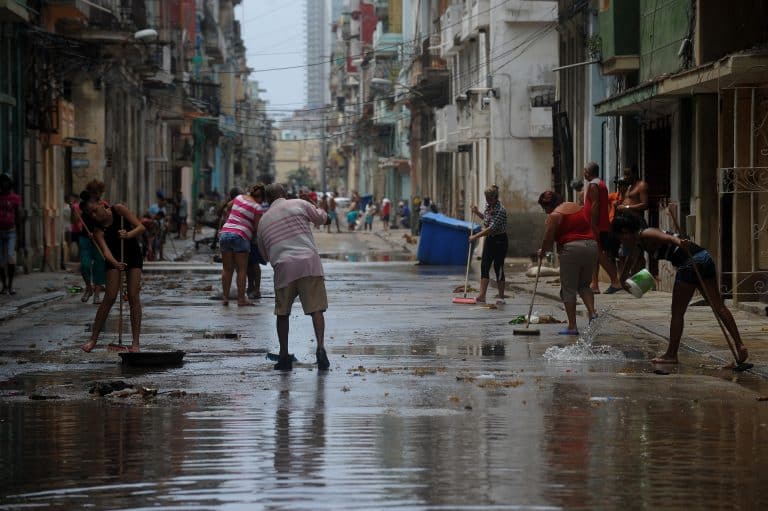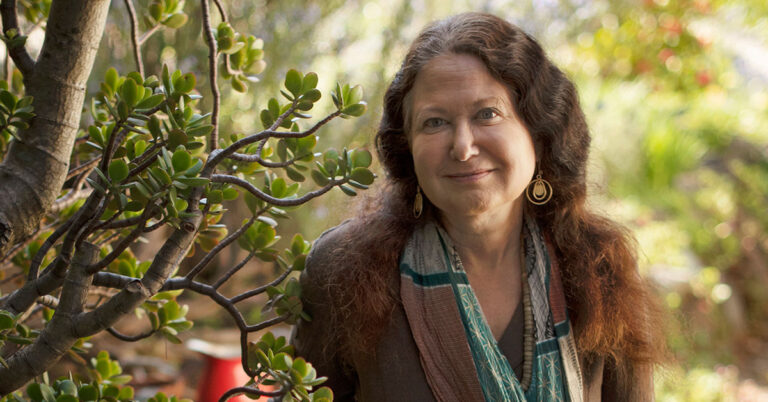
Image by Yamil Lage/Agence France-Presse / Getty Images, © All Rights Reserved.
Seeking the Spirit in the Midst of a Hurricane
In the course of two weeks, we have had two hurricanes, Harvey and Irma, each of which has been presented as the “storm of the century.” Hurricane Harvey hammered Texas, Hurricane Irma the Caribbean and Florida. The size of Irma dwarfed Florida, bringing winds as high as 185 miles per hour. The destruction has been horrific. Millions have evacuated Florida and four people have died.
There seems to be something in the air. During the same time, monsoons in India, Nepal, and Bangladesh have killed more than a thousand people and another 41 million people are suffering as a result of torrential rains and flooding. While the east coast of the United States is drowning, much of the western part is burning up, literally with wildfires and metaphorically with record high temperatures of 106 degrees in San Francisco.
The storm, particularly Hurricane Irma, is quite personal to me. My own dear brother, Farzad, and his wife Kathy, and their two beautiful children live in Miami. A couple of years ago, they put their life savings into buying a house. It is a beautiful older home, and it needed a lot of updating. They have lovingly updated the sink, the refrigerator, the stove, washer and dryer, and so on. They evacuated their house on Thursday, right before the onslaught of the deadly storm. They own one car, and they had to engage in one of the most ascetic tasks anyone should ever have to do. Once they had put the four of them in their only car, they had to decide: What else do we take? What is worth carrying with us, if we never get to see this home again? As I write these words, it is unclear to them whether their home will withstand the storm. My parents, my other brother, and my sister are all hunkered down in a home, without power. Yes, this is personal. It hits very close to home.
To some, it may seem strange to ask questions about seeking the spirit in the midst of a storm, the proverbial “where is God when it hurts.” I disagree.
We keep insisting that God is not a cosmic Santa Claus and not a simple giver of goodies and gifts. If God is to be relevant, the same God of the sunny days has to be a God of the storms. If God is real, the God of the mountaintop has to be the God of the valleys. As always, we begin not with God, but with our own selves. There is no way of getting to God without starting with, and going through, our own messy and beautiful humanity.

The Economist reported that there are now four hundred extreme weather events per year, four times as often as there were in 1970. We would be remiss to not entertain the very real possibility that these extreme weather events are directly related to the general warming of the planet, and the ongoing crisis of climate change. If I may borrow the metaphor of the White Walkers from Game of Thrones (yes, again) that I have already used once to talk about racism, one cannot help but think we are like the foolish parties in Westeros arguing over the fate of this party or that party (“who should sit on the Iron Throne”). There is a deadly army at our gate that would wipe out all of our existence altogether, and it is climate change. This is the only planet so far that we have found inhabitable life for our species, and we might well be doing irreparable damage to our only home. The question is not so much where is God, but where is sanity, where is compassion, where is wisdom, where is… humanity? Where are we?
The storms teach me something about us: our sheer folly. Are willing to see our own complicity in all of this? The way we — at least those of us in the West and in industrial countries like China — are living is simply not sustainable for the planet. How we treat the planet, our relationship with the natural cosmos, is an indication of our own spiritual health. If we continue to burn fossil fuels, consume and consume and warm up the planet, even a few degrees, there will be enough melting of polar ice and resulting rising of oceans that entire coastal areas will be under water. More melting of the polar ice, and entire cities will be under water — and the very shape of continents will be different. How foolish are a people who refuse to save their only home. How deep is our denial, the ignorance.
I do pray that I am wrong, but every bone in my body tells me that unless there is a real spiritual, moral, ethical, political, and environmental repentance on our parts, that these “unprecedented” storms and hurricanes, floods and wildfires, may well be a harbinger of the future that we are creating for our children and grandchildren.
But these hurricanes also teach me about the humanity that is left in us humans. Maybe this is why hurricanes and earthquakes bring out the best in so many people, whether it is through donations, Muslims opening up their places of worship, or volunteering. We live in such morally and politically divided ages. When a natural disaster hits, we can be sad, we can be in awe, but few of us can be morally mad at a hurricane.
So in the absence of anger or revenge or blame, we resort to that in us which is perhaps most primal, most fundamental: compassion, love, service. That’s why the response of so many in times of natural disasters reaffirms my faith that people are fundamentally good. So many act not because they expect to be valorized on the news, or be tweeted about, but simply because it is unthinkable to not act when we see others suffering. We act through direct compassion, refusing to leave the saving of another life to the next person. There is hope for us humans yet, if we make this compassion an everyday ethic.
The storm also makes me ponder more truth about God. Many religious traditions state that God has both a wrathful face and a merciful face. We see these as the awful and erotic faces of God in the Hindu traditions. In both the Hebrew Bible and the New Testament, there are references to God’s wrath. Naturally both scriptures also contain many references to God’s mercy and love. The same pattern exists in the Qur’an. The Qur’an, like the Bible, speaks both of God’s wrath and God’s mercy. And Muhammad stated that God has stated that the Divine has a wrath and a mercy, but that God’s mercy comes before, wraps around, and goes after the wrath.

Indeed there is a majestic wrath to God (jalal), and a more fundamental mercy and love, a beauty and a tenderness (jamal). In the Islamic tradition we are taught that to understand God perfectly, and to see the Perfection (kamal) of God, this majesty (jalal) and beauty (jamal) have to come together. May majesty never be bereft of beauty and mercy. May the God of storms and hurricanes also be the God of sunshine, the God of shade, the God of soft rain, the God of butterflies, lovers’ cuddles, and babies giggles.
Looking at the hurricane, pondering the devastating destruction of homes in the Caribbean and Florida and Texas and Bangladesh, I wonder if we are looking at what the world would be like if God’s mercy abandoned us. Looking at so many who claim to be religious but have no mercy, no tenderness, no beauty, but only wrath, I wonder if it is not rooted in seeing God only as wrathful, never as beautiful.
It is not quite a God-forsaken world, but a God’s mercy-abandoned world.
Let us cling to the mercy, friends.
Let us cling to the mercy among us.
Let us bind ourselves to living in mercy with God’s creation.
Let us be bathed in God’s mercy.Oh most merciful of all the Mercifuls, have mercy on us foolish, ignorant creatures.
Have mercy on us when wrath is what we might have deserved.
Have mercy on us so we may live.Have mercy on us. And teach us to shine that mercy onto one another.
Mercy.

